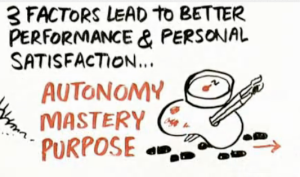The EdTech 532 class I'm taking this semester uses a
gamification structure. From what I can tell, most of the students in the class are finding this class structure motivating. I have felt like the class curmudgeon because I am having a completely opposite reaction. I'm not motivated. I'm not engaged. I'm doing the "quests" just because I need to in order to earn enough points to "win" the class.
Today I discovered why I feel the way I do. I watched
this video by
Dan Pink about what motivates us. He pointed out three key elements that lead to better performance and personal satisfaction, which are important influences on motivation. I discovered that, for me, gamifying a class took away these three factors.

- Autonomy
You're probably scratching your head. How could I not feel autonomous in a class where I get to choose my assignments, I don't have deadlines, and I rely on no one else in the class to get my work done?First, the "free choices" are not really free. I have to do some quests in order to unlock other, unknown, quests. I have rarely found that the quests I do supply learning necessary to the quests I unlock. As a person who, admittedly, is too logical for her own good, I'm frustrated by things that have no rhyme or reason. I choose some tasks that I'm not really thrilled with in order to open up greater choices that, hopefully, I'll like better.
Secondly, autonomy as a key to better performance is not so much about choices as it is about being able to set your own course--figure out how you want to get from point A to point B. This sense of autonomy is like knowing you have to drive to the store, but you can get there any way you choose. In EdTech532, I know point B is a game model. I know I need to learn a few things before I can start working on the game model, but the quests I have encountered so far are out of alignment with the type of game I want to make.
I can't say I'm not learning anything from the quests. It's more that the quests are taking me on a meandering path of detours and I'm not quite sure when I'll ever make it to the highway where I'll have greater access to the tools I need to build a game.
As I mentioned, as I complete quests, more quests are unlocked. I am starting to see greater options in some quests, so the highway may not be far off.
- Mastery
Each time I complete a quest, I earn points. I can't master a quest. Either I do it and get points, or I don't do it and don't get points. I assume if I didn't reach some level of expectation, I would be asked to do the quest again, but I have no idea what the level of expectation is. I only know what the minimum requirement is. I've been given some "awards" for my outstanding work, but I do not know what I did to earn those awards. I don't know which quests I did at a level of performance worthy of an award. I can't aim for mastery when mastery is not defined.
- Purpose
This gets back to the fact that I'm too logical for my own good and don't understand the purpose of many of the quests. I feel like I'm wasting my time playing games. I understand that I need to explore a variety of game types in order to know what I think works or doesn't work. And I need to be pushed to explore game types I don't like because I'm not building a game just for myself. I know I just need to be patient as "all things will be revealed" eventually. I just don't get it...yet.
Putting what I've learned about drive back into the context of
gamification, my opinion based on my current experience is that a gamification "shell" will not provide sustained motivation. You can't just put points on assignments and call it a game. But if you can incorporate a feeling of purpose and mastery and a sense of real choices, gamification may work on a longer term.
What I think may be the most challenging to incorporate into the gamification model is mastery. Students have to have an understanding of the meaning behind the points they earn. Reaching the level of "cadet" with only the understanding that you got there by earning 500 points will not contribute to a student's sense of mastery. The student needs to feel that he/she improved in some way as an outcome of doing the activities that contributed to a 500-point score.


No comments:
Post a Comment